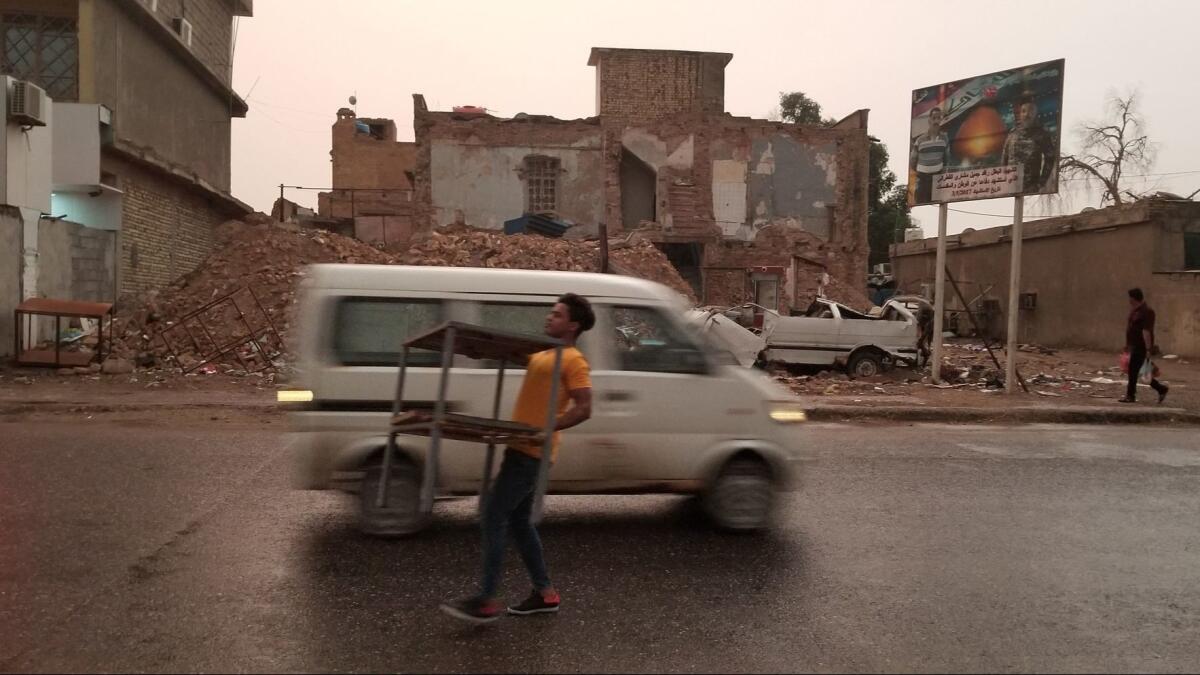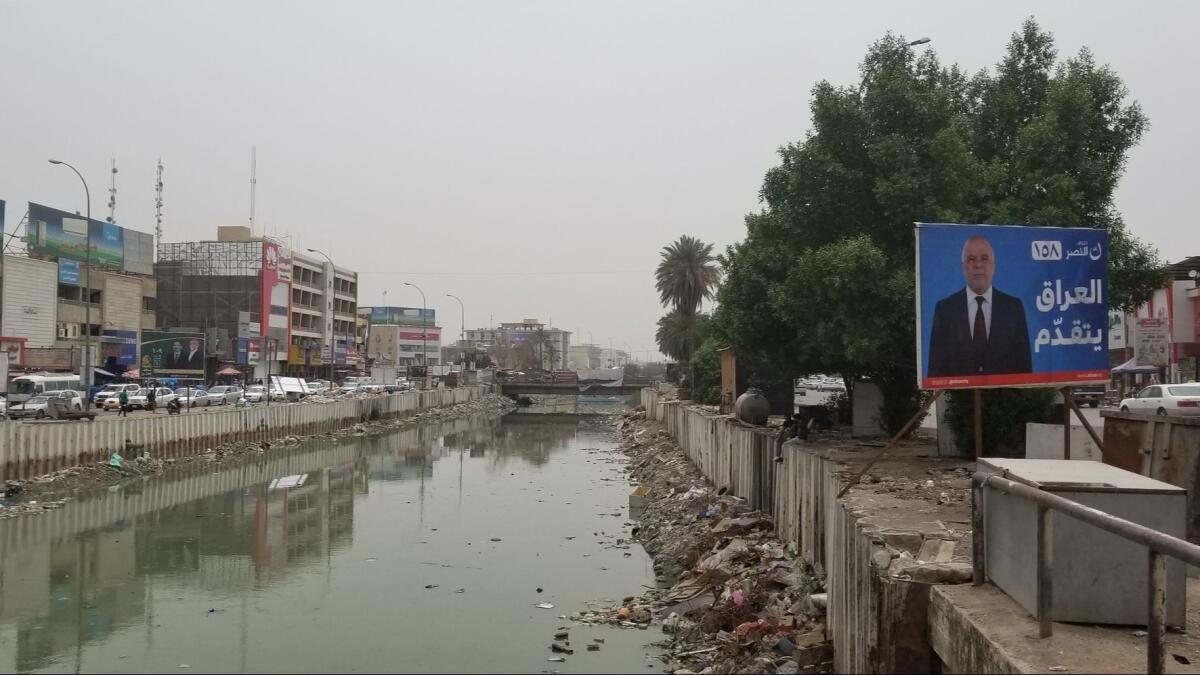Basra was once a jewel of a city. Now it’s a symbol of what’s wrong in Iraq

- Share via
Reporting from Basra, Iraq — The freshwater canals that once honeycombed through the city earned it the name the Venice of the East. Elegant walkways flanked the Shatt al Arab, the river cutting through the city. Legend has it that Sinbad the Sailor embarked on a journey from Basra’s shores.
Given its rich history and location, Basra should be booming today. It’s a metropolis of more than 2 million, home to Iraq’s only port and its main gateway to Iran. It’s the capital of the eponymous province that, with more than 200 billion barrels of estimated reserves, provides a staggering 80% of Iraq’s oil riches.
But the canals, what’s left of them, now are lined with trash and exude a miasma tinged with the scent of sewage. A stroll along the banks of the Shatt al Arab offers little more than glimpses of crumbling walkways and the rotting hulks of ships long abandoned. And though multinational energy companies have swarmed here for decades, unemployment abounds.
Though it was left unscathed in the brutal four-year war against Islamic State, Basra is where the scars of Iraq’s troubles are most apparent: the perennial weakness of the state, the factions and tribes operating under their own laws, the deep-rooted corruption fueled by oil greed and — now — a thriving drug trade.
With Iraqis’ dissatisfaction with government at an all-time high, it is places like Basra that will test whether Iraq can return to the world stage as a functioning nation, or revert to the toxic mix of sectarianism and corruption that spurred the jihadis’ rise in the first place.
There was a time when Basra, a city slightly larger than Washington, was considered one of the region’s epicenters. Founded in 636 along the 120-mile-long waterway created the by joining of the Tigris and Euphrates, Basra became an essential stop for world travelers, such as the 14th century scholar Ibn Battuta.
“Basra’s past is better than its present,” said Jabbar Saaedi, the head of the city’s security council. “[For] all of those who visited Basra in the ’70s, even in the ’80s, before the Iran-Iraq war, it was a beautiful place.”
And in the U.S.-led war on Iraq in 2003, the Americans and British, realizing its strategic value, made Basra the first city they invaded. Later on, they pushed it as the centerpiece of Iraq in the post-Saddam Hussein era.
British troops, weary of fighting the Shiite militia called the Mahdi Army, transferred control to Iraqi authorities in 2007, and a year later government forces ousted the militiamen from the city.
With order restored, Basra was rejuvenated. Oil companies came in droves. Glitzy architecture projects, including a proposed 230-story skyscraper (it was to be the world’s tallest) called “the Bride,” were to help Basra eclipse other regional boom towns like Dubai.
But that all ended in 2014, when Islamic State launched its blitzkrieg across Iraq’s northern regions. Though the militants never reached Basra, their effect was immediate.
“Troops were needed to go up north to deal with ISIS ... and you saw a degradation of the security institution in Basra,” Ben Lando, head of the business publication Iraq Oil Report, said, referring to the group by one of its acronyms.
“The B team came in.”
With Basra no longer under tight control, the militias had a resurgence, unleashing a wave of kidnapping, theft and drug trafficking.
The province’s constantly warring tribes joined the fray. They had engaged in oil smuggling during the days of Saddam. Though there was less smuggling, tribesmen were often engaged by oil companies to protect (in other words, refrain from blowing up) pipelines running through areas they considered their own.
Now, the tribesmen, often heavily armed, fight among each other, said Yarub Mahmoudiyah, head of a committee for the resolution of tribal conflicts in Basra, to net the “fantastical sums” paid by the oil companies to drill in an area.
“Say a company wants to invest in a certain area. It’s been long abandoned, but then two tribes claim ownership of it in the last 20 or 50 years,” Mahmoudiyah said.
“So then they both come and start fighting over it. And the company can’t do work.”
Meanwhile, the demands of the war against Islamic State, along with the deflation in oil prices, meant that Basra, whose oil fields produce some 3.7 million barrels per day, was getting no money from a cash-strapped federal government.
“We were supposed to receive $5 for every barrel of crude oil, $5 for every barrel of refined oil, and $5 for every 150 cubic meters of gas. We’re also supposed to get half of the border fees from ports and land crossings,” said Ali Shaddad, the head of the provincial council’s oil and gas committee.
“Since mid-2015, we haven’t received any money from our petro dollars. The government refuses to pay, telling us it has no money to give.”
Shaddad said the municipality is often unable to pay its employees, and some 700 projects, including the building of schools, hospitals and infrastructure, have been postponed.
“Most of those contracts were given to local firms, so even our private sector was affected,” he added.
And with the government laser-focused on developing oil and gas, the province’s famous verdant farmlands have been devastated, even as Basrawis, as the people of Basra are known, have little to show for it. Much of the water in Basra has turned brackish, a result of years of poor water management — excessive use upstream and excavation and dredging that allowed saltwater from the Persian Gulf to invade Shatt al Arab.
“What good did it do for us, having this oil and the port? Can you wash with fresh water here? No way, it’s always salty,” shouted Um Ammar, a 32-year old saleswoman at a clothing store in the Ashar market. She gave only her nickname for fear of reprisals.
“All of our river water got destroyed. Go to Shatt al Arab. There’s no fish there.”
She also spoke of garbage that stays uncollected for days, and of streets that remain unpaved.
As she began to rail against the frequent electricity shortages endured by residents, the neon lights in her shop turned off and generators whined as they kicked in; yet another power outage had begun.
“See? Summer is coming and it’s going to be boiling here,” Um Ammar said. It’s not unusual for summer temperatures to hit 122 degrees.
Despite these drawbacks, some 40,000 Iraqis from other provinces have flocked to the city in recent years, said Saeedi. They join hundreds of thousands of Basrawis in a desperate search for employment in the oil sector, which, despite accounting for 65% of Iraq’s gross domestic product, only employs 1% of the nation’s labor force, according to the U.N.
Few residents work in their actual area of education or training. The luckier ones often have to pay bribes to land blue-collar jobs as cleaners or drivers.
Most, however, are unemployed, living in ravaged neighborhoods or shantytowns with little to do. They are easy prey for Basra’s newest threat: crystal meth.
It’s big business. A gram of crystal meth can sell for roughly $70 here.
In the past, Basra had been a conduit for the drug, transferring it from Iran to Persian Gulf countries such as Saudi Arabia. Now much of the drug stays in Basra.
“Weekly we catch something on the crossing with Iran, people smuggling drugs in shoes, clothes or even underwear,” Saaedi said.
Others, speaking on condition of anonymity for safety concerns, said the drug trade involved Shiite militias, tribesmen and prominent officials colluding with drug rings.
Worse still, said Mahmoudiyah, the tribal arbitrator, now Basra itself had become an exporter.
“You have factories here producing this drug,” he said.
Its effects have been devastating: No fewer than 1,700 men are in prison on drug charges, flooding a prison system ill-equipped to deal with addicts.
“The user is not a criminal, they’re a victim. But the law treats them like a criminal, and puts them in the same place as a murderer,” Shaddad said. “Many of them enter as users and leave as dealers.”
He and the other officials interviewed insisted there was a need for rehabilitation centers. Mahmoudiyah had even asked oil companies to fund one such clinic. He’s still waiting for a response.
Although the government conducted raids in February to crack down on crime, residents, including Um Ammar, dismissed the move as little more than posturing in the run-up to the parliamentary elections.
“The officials here, they’re all thieves. All of them,” she said.
She succinctly summed this ancient and once proud city. “Basra bok,” she said. Basra is all about stealing.

Bulos is a special correspondent.
Twitter: @nabihbulos
More to Read
Sign up for Essential California
The most important California stories and recommendations in your inbox every morning.
You may occasionally receive promotional content from the Los Angeles Times.











